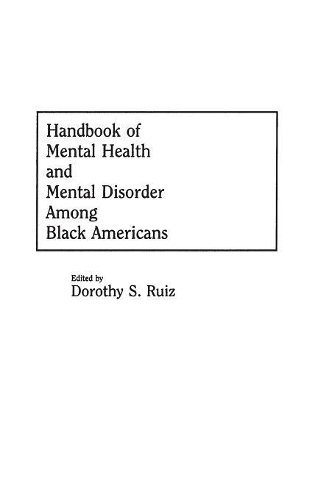
Handbook of Mental Health and Mental Disorder Among Black Americans
(Hardback)
Publishing Details
Handbook of Mental Health and Mental Disorder Among Black Americans
By (Author) Dorothy Smith-Ruiz
Bloomsbury Publishing PLC
Greenwood Press
18th September 1990
United States
Classifications
Tertiary Education
Non Fiction
Anthropology
Ethnic studies / Ethnicity
362.8496073
Physical Properties
Hardback
352
Width 156mm, Height 235mm
737g
Description
This handbook brings together crucial information related to mental illness among black Americans by examining the impact of social structures and conditions on the mental health of blacks. Choice While it is generally assumed that poverty, unemployment, and discrimination have a serious impact on the psychological well-being and functioning of black Americans, very little research has been directed to understanding or documenting the black experience from the mental health standpoint. This multidisciplinary study develops a broad perspective on the subject, with implications for both clinical practice and sociological research. In addition to examining important mental health issues, the authors look at the ways in which specific social, structural, and cultural conditions and practices affect the lives of individual Black Americans and their families. The first two parts of the book present demographic profiles of the black community and epidemiological analyses of mental disorders. The psychological stressors arising from racism are next considered, together with the social structures and coping skills that have enabled blacks to maintain networks of support. Two chapters are devoted to homicide and family violence in the black community. The remaining chapters cover psychiatric diagnosis and treatment, legal and social policy issues, and factors in positive mental health. Incorporating the contributions of sociologists, social workers, psychologists, and psychiatrists as well as mental health administrators, this book provides new data and expert analyses that will be of interest to anyone working in this rapidly expanding field.
Reviews
This handbook brings together crucial information related to mental illness among black Americans by examining the impact of social structures and conditions on the mental health of blacks. An initial overview chapter by Alvin Poussaint is dated in that it does not discuss the impact of crack cocaine and AIDS on the functioning of the black community. Even without these bleak new social factors, however, the chapter provides grim news: by any measurable standard the mental health of black Americans is in serious decline. Alcoholism represents one of their most serious mental health problems because it is associated with violent behavior. Drug abuse is a particularly insidious problem not only because of the number of deaths clearly linked to its usage, but also because of the social problems associated with its prevalence. Poussaint concludes that the social conditions faced by black Americans--poverty, racism, unemployment, female-headed households, illegitimacy, and the increasing divorce rate--place blacks at high risk for 'mental disorder, crime and family and community breakdown.' Other chapters examine the effects of racism on the development of stress and coping styles; ethnic and cultural factors as they relate to the diagnosis and treatment of mental illness; and the positive mental health attributes of blacks. Upper-division and graduate collections.-Choice
"This handbook brings together crucial information related to mental illness among black Americans by examining the impact of social structures and conditions on the mental health of blacks. An initial overview chapter by Alvin Poussaint is dated in that it does not discuss the impact of crack cocaine and AIDS on the functioning of the black community. Even without these bleak new social factors, however, the chapter provides grim news: by any measurable standard the mental health of black Americans is in serious decline. Alcoholism represents one of their most serious mental health problems because it is associated with violent behavior. Drug abuse is a particularly insidious problem not only because of the number of deaths clearly linked to its usage, but also because of the social problems associated with its prevalence. Poussaint concludes that the social conditions faced by black Americans--poverty, racism, unemployment, female-headed households, illegitimacy, and the increasing divorce rate--place blacks at high risk for 'mental disorder, crime and family and community breakdown.' Other chapters examine the effects of racism on the development of stress and coping styles; ethnic and cultural factors as they relate to the diagnosis and treatment of mental illness; and the positive mental health attributes of blacks. Upper-division and graduate collections."-Choice
Author Bio
DOROTHY S. RUIZ is Assistant Professor of Sociology at Howard University. She was a Fulbright Fellowship recipient in 1985 to study the history and culture of three West African countries. She is currently a member of several professional and community organizations.
